Analyzing Student Motivation's Impact on Classroom Engagement: Review
VerifiedAdded on 2020/10/05
|11
|2985
|415
Literature Review
AI Summary
This literature review examines the critical relationship between student motivation and classroom engagement within the context of higher education. The review synthesizes findings from seven articles published between 2010 and 2017, focusing on the roles of teachers, student self-efficacy, and various dimensions of engagement (emotional, cognitive, and behavioral). The analysis highlights the impact of teacher influence on student motivation and the correlation between student engagement levels and academic performance. It also discusses the importance of creating a positive learning environment and the implications of student goals and self-determination theory. The review concludes that fostering student motivation is essential for improving classroom engagement and academic success. Key themes include teacher's role, motivation, engagement, self-efficacy and their effects on student learning, behavior, and performance.

LITERATURE REVIEW
Paraphrase This Document
Need a fresh take? Get an instant paraphrase of this document with our AI Paraphraser
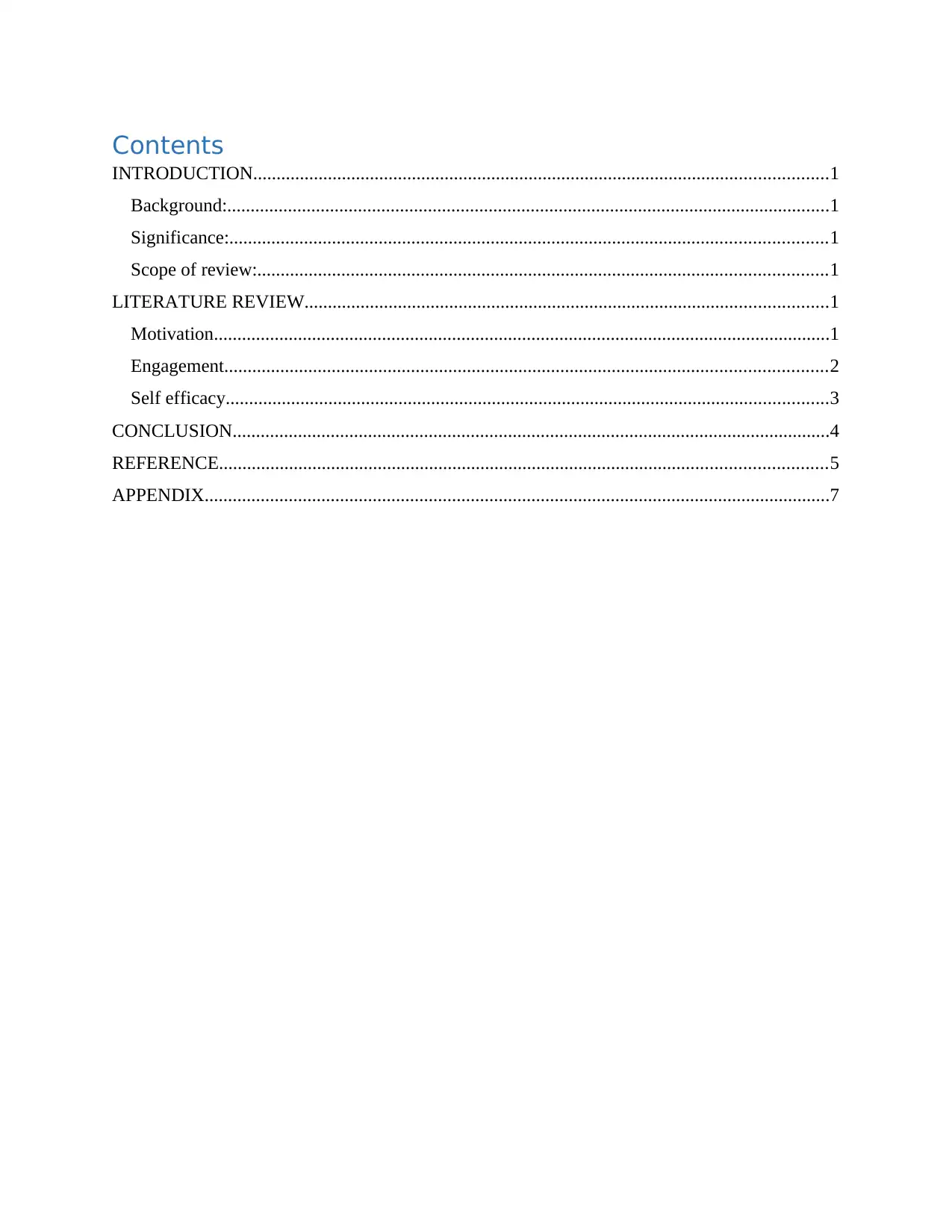
Contents
INTRODUCTION...........................................................................................................................1
Background:.................................................................................................................................1
Significance:................................................................................................................................1
Scope of review:..........................................................................................................................1
LITERATURE REVIEW................................................................................................................1
Motivation....................................................................................................................................1
Engagement.................................................................................................................................2
Self efficacy.................................................................................................................................3
CONCLUSION................................................................................................................................4
REFERENCE..................................................................................................................................5
APPENDIX......................................................................................................................................7
INTRODUCTION...........................................................................................................................1
Background:.................................................................................................................................1
Significance:................................................................................................................................1
Scope of review:..........................................................................................................................1
LITERATURE REVIEW................................................................................................................1
Motivation....................................................................................................................................1
Engagement.................................................................................................................................2
Self efficacy.................................................................................................................................3
CONCLUSION................................................................................................................................4
REFERENCE..................................................................................................................................5
APPENDIX......................................................................................................................................7
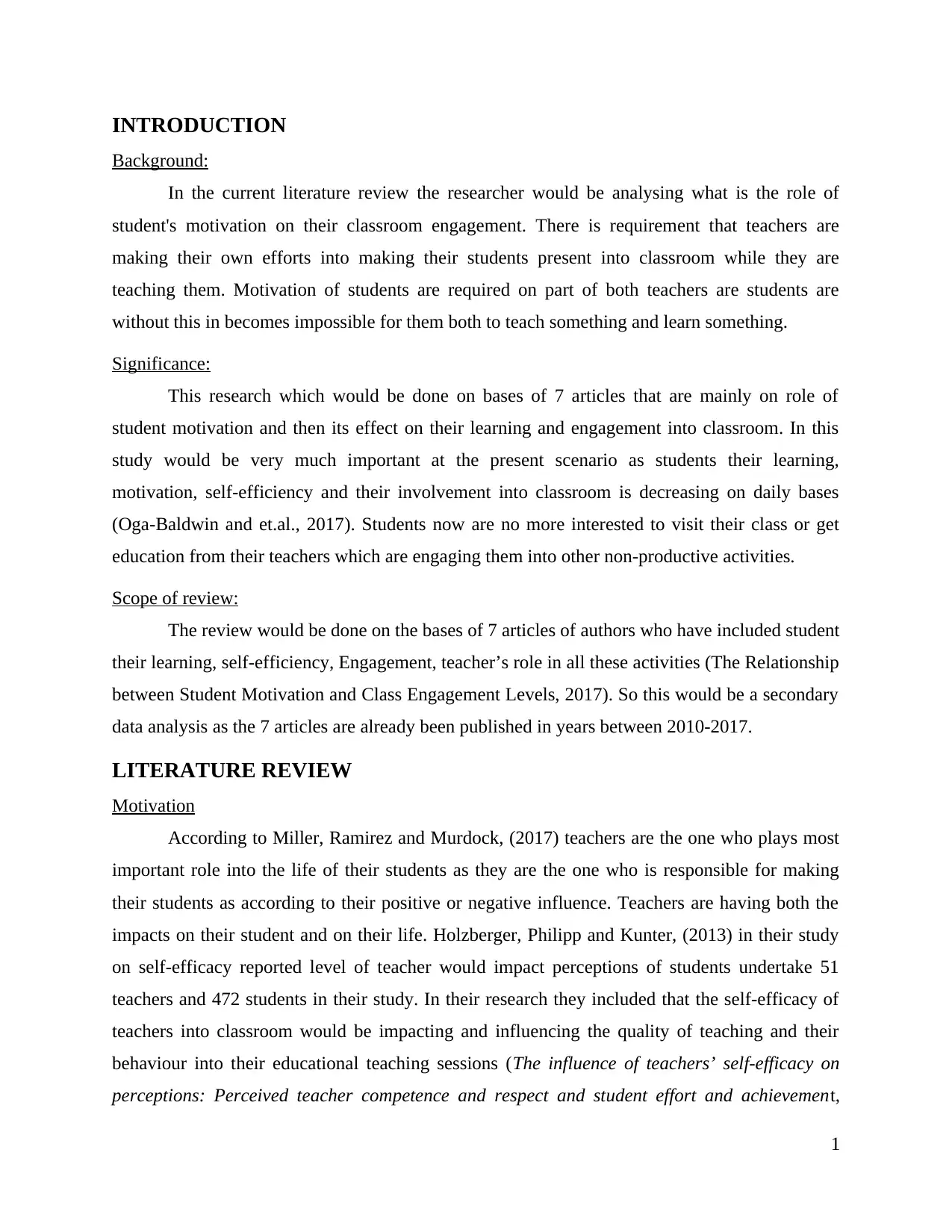
INTRODUCTION
Background:
In the current literature review the researcher would be analysing what is the role of
student's motivation on their classroom engagement. There is requirement that teachers are
making their own efforts into making their students present into classroom while they are
teaching them. Motivation of students are required on part of both teachers are students are
without this in becomes impossible for them both to teach something and learn something.
Significance:
This research which would be done on bases of 7 articles that are mainly on role of
student motivation and then its effect on their learning and engagement into classroom. In this
study would be very much important at the present scenario as students their learning,
motivation, self-efficiency and their involvement into classroom is decreasing on daily bases
(Oga-Baldwin and et.al., 2017). Students now are no more interested to visit their class or get
education from their teachers which are engaging them into other non-productive activities.
Scope of review:
The review would be done on the bases of 7 articles of authors who have included student
their learning, self-efficiency, Engagement, teacher’s role in all these activities (The Relationship
between Student Motivation and Class Engagement Levels, 2017). So this would be a secondary
data analysis as the 7 articles are already been published in years between 2010-2017.
LITERATURE REVIEW
Motivation
According to Miller, Ramirez and Murdock, (2017) teachers are the one who plays most
important role into the life of their students as they are the one who is responsible for making
their students as according to their positive or negative influence. Teachers are having both the
impacts on their student and on their life. Holzberger, Philipp and Kunter, (2013) in their study
on self-efficacy reported level of teacher would impact perceptions of students undertake 51
teachers and 472 students in their study. In their research they included that the self-efficacy of
teachers into classroom would be impacting and influencing the quality of teaching and their
behaviour into their educational teaching sessions (The influence of teachers’ self-efficacy on
perceptions: Perceived teacher competence and respect and student effort and achievement,
1
Background:
In the current literature review the researcher would be analysing what is the role of
student's motivation on their classroom engagement. There is requirement that teachers are
making their own efforts into making their students present into classroom while they are
teaching them. Motivation of students are required on part of both teachers are students are
without this in becomes impossible for them both to teach something and learn something.
Significance:
This research which would be done on bases of 7 articles that are mainly on role of
student motivation and then its effect on their learning and engagement into classroom. In this
study would be very much important at the present scenario as students their learning,
motivation, self-efficiency and their involvement into classroom is decreasing on daily bases
(Oga-Baldwin and et.al., 2017). Students now are no more interested to visit their class or get
education from their teachers which are engaging them into other non-productive activities.
Scope of review:
The review would be done on the bases of 7 articles of authors who have included student
their learning, self-efficiency, Engagement, teacher’s role in all these activities (The Relationship
between Student Motivation and Class Engagement Levels, 2017). So this would be a secondary
data analysis as the 7 articles are already been published in years between 2010-2017.
LITERATURE REVIEW
Motivation
According to Miller, Ramirez and Murdock, (2017) teachers are the one who plays most
important role into the life of their students as they are the one who is responsible for making
their students as according to their positive or negative influence. Teachers are having both the
impacts on their student and on their life. Holzberger, Philipp and Kunter, (2013) in their study
on self-efficacy reported level of teacher would impact perceptions of students undertake 51
teachers and 472 students in their study. In their research they included that the self-efficacy of
teachers into classroom would be impacting and influencing the quality of teaching and their
behaviour into their educational teaching sessions (The influence of teachers’ self-efficacy on
perceptions: Perceived teacher competence and respect and student effort and achievement,
1
⊘ This is a preview!⊘
Do you want full access?
Subscribe today to unlock all pages.

Trusted by 1+ million students worldwide
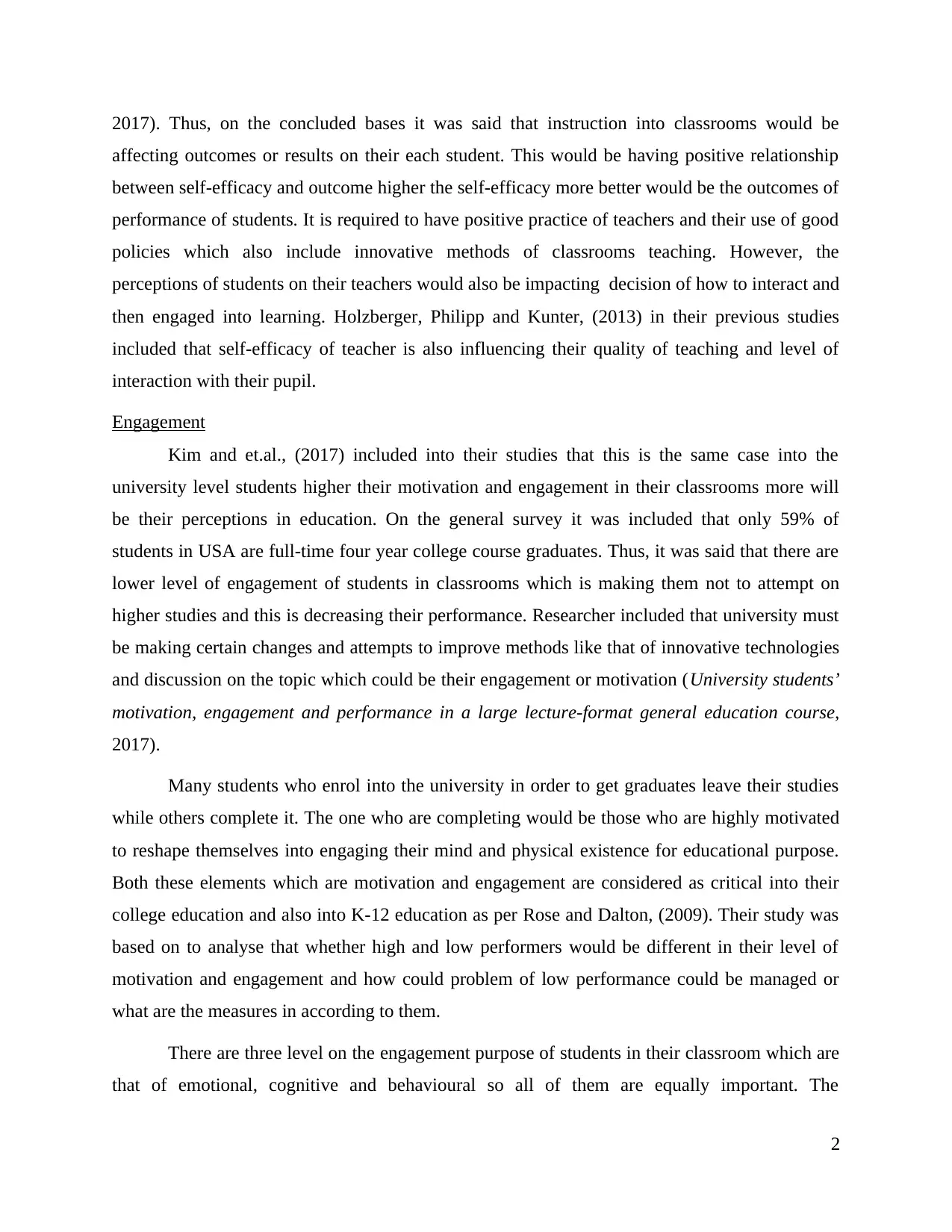
2017). Thus, on the concluded bases it was said that instruction into classrooms would be
affecting outcomes or results on their each student. This would be having positive relationship
between self-efficacy and outcome higher the self-efficacy more better would be the outcomes of
performance of students. It is required to have positive practice of teachers and their use of good
policies which also include innovative methods of classrooms teaching. However, the
perceptions of students on their teachers would also be impacting decision of how to interact and
then engaged into learning. Holzberger, Philipp and Kunter, (2013) in their previous studies
included that self-efficacy of teacher is also influencing their quality of teaching and level of
interaction with their pupil.
Engagement
Kim and et.al., (2017) included into their studies that this is the same case into the
university level students higher their motivation and engagement in their classrooms more will
be their perceptions in education. On the general survey it was included that only 59% of
students in USA are full-time four year college course graduates. Thus, it was said that there are
lower level of engagement of students in classrooms which is making them not to attempt on
higher studies and this is decreasing their performance. Researcher included that university must
be making certain changes and attempts to improve methods like that of innovative technologies
and discussion on the topic which could be their engagement or motivation (University students’
motivation, engagement and performance in a large lecture-format general education course,
2017).
Many students who enrol into the university in order to get graduates leave their studies
while others complete it. The one who are completing would be those who are highly motivated
to reshape themselves into engaging their mind and physical existence for educational purpose.
Both these elements which are motivation and engagement are considered as critical into their
college education and also into K-12 education as per Rose and Dalton, (2009). Their study was
based on to analyse that whether high and low performers would be different in their level of
motivation and engagement and how could problem of low performance could be managed or
what are the measures in according to them.
There are three level on the engagement purpose of students in their classroom which are
that of emotional, cognitive and behavioural so all of them are equally important. The
2
affecting outcomes or results on their each student. This would be having positive relationship
between self-efficacy and outcome higher the self-efficacy more better would be the outcomes of
performance of students. It is required to have positive practice of teachers and their use of good
policies which also include innovative methods of classrooms teaching. However, the
perceptions of students on their teachers would also be impacting decision of how to interact and
then engaged into learning. Holzberger, Philipp and Kunter, (2013) in their previous studies
included that self-efficacy of teacher is also influencing their quality of teaching and level of
interaction with their pupil.
Engagement
Kim and et.al., (2017) included into their studies that this is the same case into the
university level students higher their motivation and engagement in their classrooms more will
be their perceptions in education. On the general survey it was included that only 59% of
students in USA are full-time four year college course graduates. Thus, it was said that there are
lower level of engagement of students in classrooms which is making them not to attempt on
higher studies and this is decreasing their performance. Researcher included that university must
be making certain changes and attempts to improve methods like that of innovative technologies
and discussion on the topic which could be their engagement or motivation (University students’
motivation, engagement and performance in a large lecture-format general education course,
2017).
Many students who enrol into the university in order to get graduates leave their studies
while others complete it. The one who are completing would be those who are highly motivated
to reshape themselves into engaging their mind and physical existence for educational purpose.
Both these elements which are motivation and engagement are considered as critical into their
college education and also into K-12 education as per Rose and Dalton, (2009). Their study was
based on to analyse that whether high and low performers would be different in their level of
motivation and engagement and how could problem of low performance could be managed or
what are the measures in according to them.
There are three level on the engagement purpose of students in their classroom which are
that of emotional, cognitive and behavioural so all of them are equally important. The
2
Paraphrase This Document
Need a fresh take? Get an instant paraphrase of this document with our AI Paraphraser
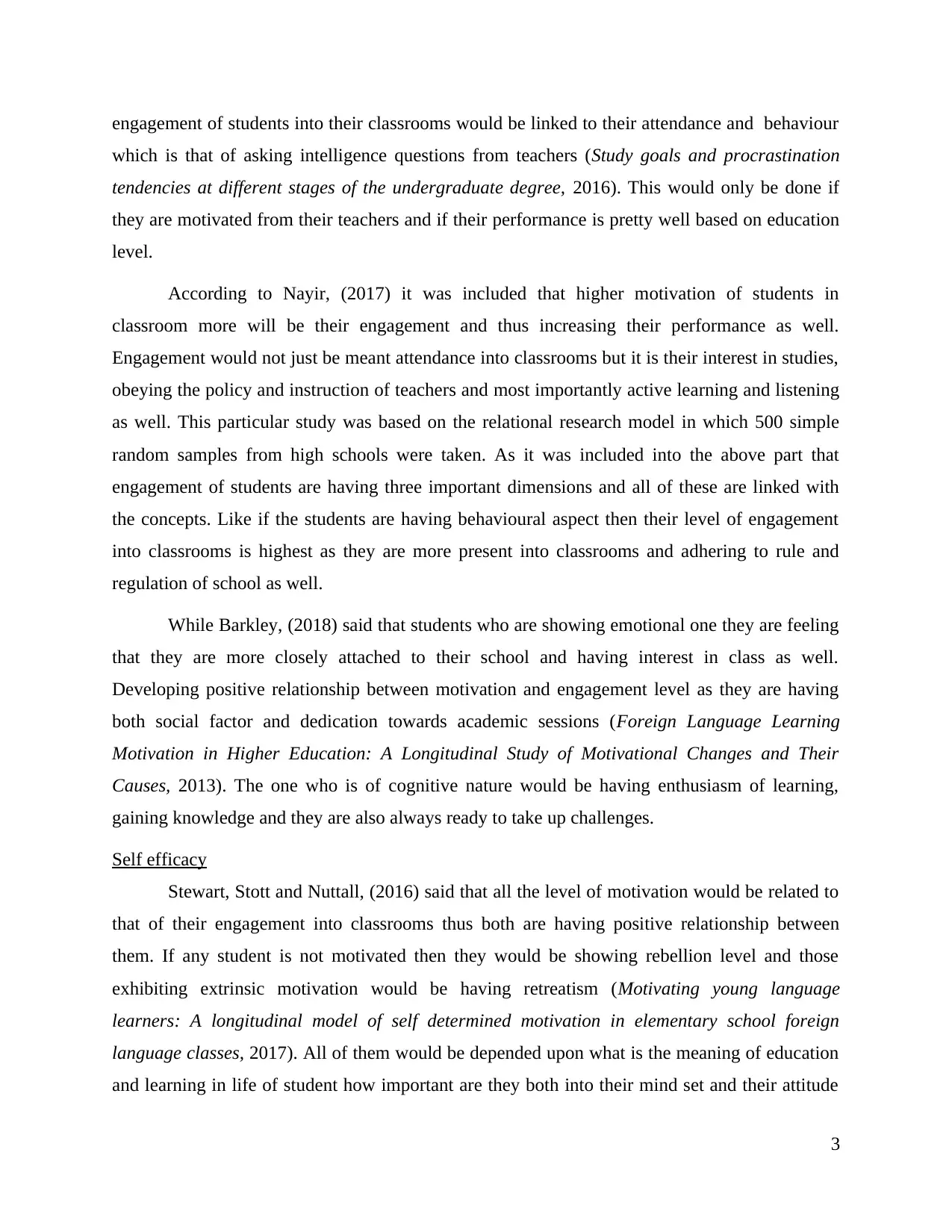
engagement of students into their classrooms would be linked to their attendance and behaviour
which is that of asking intelligence questions from teachers (Study goals and procrastination
tendencies at different stages of the undergraduate degree, 2016). This would only be done if
they are motivated from their teachers and if their performance is pretty well based on education
level.
According to Nayir, (2017) it was included that higher motivation of students in
classroom more will be their engagement and thus increasing their performance as well.
Engagement would not just be meant attendance into classrooms but it is their interest in studies,
obeying the policy and instruction of teachers and most importantly active learning and listening
as well. This particular study was based on the relational research model in which 500 simple
random samples from high schools were taken. As it was included into the above part that
engagement of students are having three important dimensions and all of these are linked with
the concepts. Like if the students are having behavioural aspect then their level of engagement
into classrooms is highest as they are more present into classrooms and adhering to rule and
regulation of school as well.
While Barkley, (2018) said that students who are showing emotional one they are feeling
that they are more closely attached to their school and having interest in class as well.
Developing positive relationship between motivation and engagement level as they are having
both social factor and dedication towards academic sessions (Foreign Language Learning
Motivation in Higher Education: A Longitudinal Study of Motivational Changes and Their
Causes, 2013). The one who is of cognitive nature would be having enthusiasm of learning,
gaining knowledge and they are also always ready to take up challenges.
Self efficacy
Stewart, Stott and Nuttall, (2016) said that all the level of motivation would be related to
that of their engagement into classrooms thus both are having positive relationship between
them. If any student is not motivated then they would be showing rebellion level and those
exhibiting extrinsic motivation would be having retreatism (Motivating young language
learners: A longitudinal model of self determined motivation in elementary school foreign
language classes, 2017). All of them would be depended upon what is the meaning of education
and learning in life of student how important are they both into their mind set and their attitude
3
which is that of asking intelligence questions from teachers (Study goals and procrastination
tendencies at different stages of the undergraduate degree, 2016). This would only be done if
they are motivated from their teachers and if their performance is pretty well based on education
level.
According to Nayir, (2017) it was included that higher motivation of students in
classroom more will be their engagement and thus increasing their performance as well.
Engagement would not just be meant attendance into classrooms but it is their interest in studies,
obeying the policy and instruction of teachers and most importantly active learning and listening
as well. This particular study was based on the relational research model in which 500 simple
random samples from high schools were taken. As it was included into the above part that
engagement of students are having three important dimensions and all of these are linked with
the concepts. Like if the students are having behavioural aspect then their level of engagement
into classrooms is highest as they are more present into classrooms and adhering to rule and
regulation of school as well.
While Barkley, (2018) said that students who are showing emotional one they are feeling
that they are more closely attached to their school and having interest in class as well.
Developing positive relationship between motivation and engagement level as they are having
both social factor and dedication towards academic sessions (Foreign Language Learning
Motivation in Higher Education: A Longitudinal Study of Motivational Changes and Their
Causes, 2013). The one who is of cognitive nature would be having enthusiasm of learning,
gaining knowledge and they are also always ready to take up challenges.
Self efficacy
Stewart, Stott and Nuttall, (2016) said that all the level of motivation would be related to
that of their engagement into classrooms thus both are having positive relationship between
them. If any student is not motivated then they would be showing rebellion level and those
exhibiting extrinsic motivation would be having retreatism (Motivating young language
learners: A longitudinal model of self determined motivation in elementary school foreign
language classes, 2017). All of them would be depended upon what is the meaning of education
and learning in life of student how important are they both into their mind set and their attitude
3
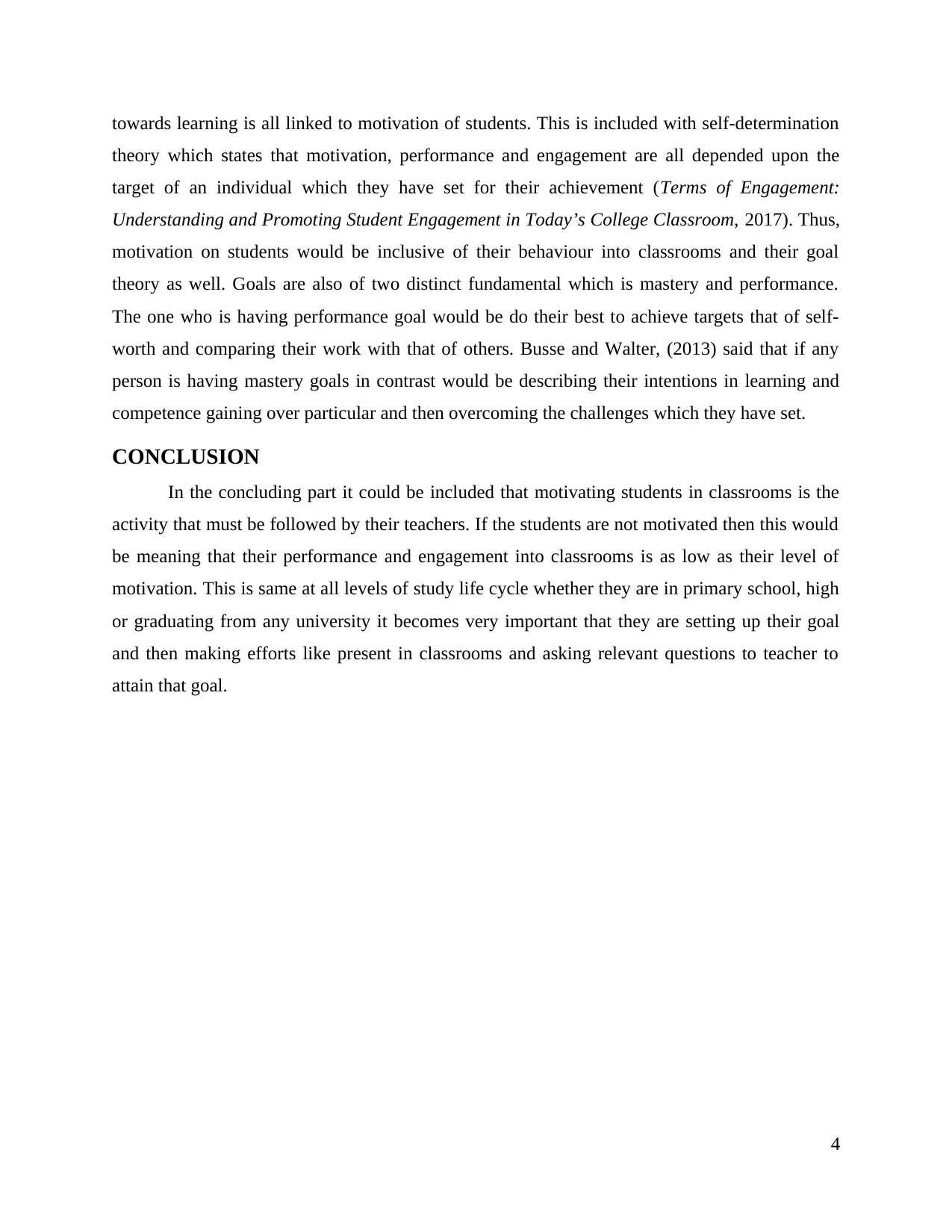
towards learning is all linked to motivation of students. This is included with self-determination
theory which states that motivation, performance and engagement are all depended upon the
target of an individual which they have set for their achievement (Terms of Engagement:
Understanding and Promoting Student Engagement in Today’s College Classroom, 2017). Thus,
motivation on students would be inclusive of their behaviour into classrooms and their goal
theory as well. Goals are also of two distinct fundamental which is mastery and performance.
The one who is having performance goal would be do their best to achieve targets that of self-
worth and comparing their work with that of others. Busse and Walter, (2013) said that if any
person is having mastery goals in contrast would be describing their intentions in learning and
competence gaining over particular and then overcoming the challenges which they have set.
CONCLUSION
In the concluding part it could be included that motivating students in classrooms is the
activity that must be followed by their teachers. If the students are not motivated then this would
be meaning that their performance and engagement into classrooms is as low as their level of
motivation. This is same at all levels of study life cycle whether they are in primary school, high
or graduating from any university it becomes very important that they are setting up their goal
and then making efforts like present in classrooms and asking relevant questions to teacher to
attain that goal.
4
theory which states that motivation, performance and engagement are all depended upon the
target of an individual which they have set for their achievement (Terms of Engagement:
Understanding and Promoting Student Engagement in Today’s College Classroom, 2017). Thus,
motivation on students would be inclusive of their behaviour into classrooms and their goal
theory as well. Goals are also of two distinct fundamental which is mastery and performance.
The one who is having performance goal would be do their best to achieve targets that of self-
worth and comparing their work with that of others. Busse and Walter, (2013) said that if any
person is having mastery goals in contrast would be describing their intentions in learning and
competence gaining over particular and then overcoming the challenges which they have set.
CONCLUSION
In the concluding part it could be included that motivating students in classrooms is the
activity that must be followed by their teachers. If the students are not motivated then this would
be meaning that their performance and engagement into classrooms is as low as their level of
motivation. This is same at all levels of study life cycle whether they are in primary school, high
or graduating from any university it becomes very important that they are setting up their goal
and then making efforts like present in classrooms and asking relevant questions to teacher to
attain that goal.
4
⊘ This is a preview!⊘
Do you want full access?
Subscribe today to unlock all pages.

Trusted by 1+ million students worldwide
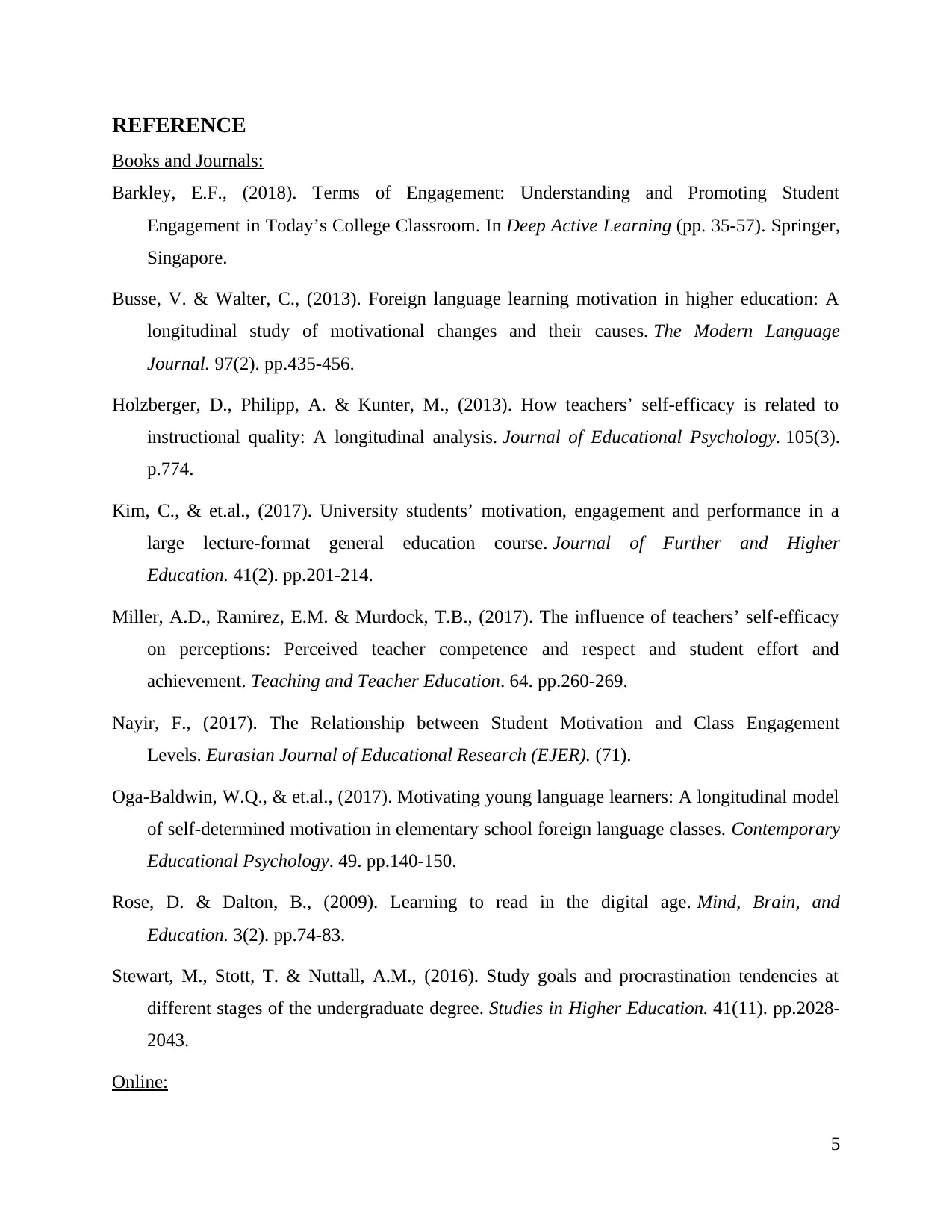
REFERENCE
Books and Journals:
Barkley, E.F., (2018). Terms of Engagement: Understanding and Promoting Student
Engagement in Today’s College Classroom. In Deep Active Learning (pp. 35-57). Springer,
Singapore.
Busse, V. & Walter, C., (2013). Foreign language learning motivation in higher education: A
longitudinal study of motivational changes and their causes. The Modern Language
Journal. 97(2). pp.435-456.
Holzberger, D., Philipp, A. & Kunter, M., (2013). How teachers’ self-efficacy is related to
instructional quality: A longitudinal analysis. Journal of Educational Psychology. 105(3).
p.774.
Kim, C., & et.al., (2017). University students’ motivation, engagement and performance in a
large lecture-format general education course. Journal of Further and Higher
Education. 41(2). pp.201-214.
Miller, A.D., Ramirez, E.M. & Murdock, T.B., (2017). The influence of teachers’ self-efficacy
on perceptions: Perceived teacher competence and respect and student effort and
achievement. Teaching and Teacher Education. 64. pp.260-269.
Nayir, F., (2017). The Relationship between Student Motivation and Class Engagement
Levels. Eurasian Journal of Educational Research (EJER). (71).
Oga-Baldwin, W.Q., & et.al., (2017). Motivating young language learners: A longitudinal model
of self-determined motivation in elementary school foreign language classes. Contemporary
Educational Psychology. 49. pp.140-150.
Rose, D. & Dalton, B., (2009). Learning to read in the digital age. Mind, Brain, and
Education. 3(2). pp.74-83.
Stewart, M., Stott, T. & Nuttall, A.M., (2016). Study goals and procrastination tendencies at
different stages of the undergraduate degree. Studies in Higher Education. 41(11). pp.2028-
2043.
Online:
5
Books and Journals:
Barkley, E.F., (2018). Terms of Engagement: Understanding and Promoting Student
Engagement in Today’s College Classroom. In Deep Active Learning (pp. 35-57). Springer,
Singapore.
Busse, V. & Walter, C., (2013). Foreign language learning motivation in higher education: A
longitudinal study of motivational changes and their causes. The Modern Language
Journal. 97(2). pp.435-456.
Holzberger, D., Philipp, A. & Kunter, M., (2013). How teachers’ self-efficacy is related to
instructional quality: A longitudinal analysis. Journal of Educational Psychology. 105(3).
p.774.
Kim, C., & et.al., (2017). University students’ motivation, engagement and performance in a
large lecture-format general education course. Journal of Further and Higher
Education. 41(2). pp.201-214.
Miller, A.D., Ramirez, E.M. & Murdock, T.B., (2017). The influence of teachers’ self-efficacy
on perceptions: Perceived teacher competence and respect and student effort and
achievement. Teaching and Teacher Education. 64. pp.260-269.
Nayir, F., (2017). The Relationship between Student Motivation and Class Engagement
Levels. Eurasian Journal of Educational Research (EJER). (71).
Oga-Baldwin, W.Q., & et.al., (2017). Motivating young language learners: A longitudinal model
of self-determined motivation in elementary school foreign language classes. Contemporary
Educational Psychology. 49. pp.140-150.
Rose, D. & Dalton, B., (2009). Learning to read in the digital age. Mind, Brain, and
Education. 3(2). pp.74-83.
Stewart, M., Stott, T. & Nuttall, A.M., (2016). Study goals and procrastination tendencies at
different stages of the undergraduate degree. Studies in Higher Education. 41(11). pp.2028-
2043.
Online:
5
Paraphrase This Document
Need a fresh take? Get an instant paraphrase of this document with our AI Paraphraser
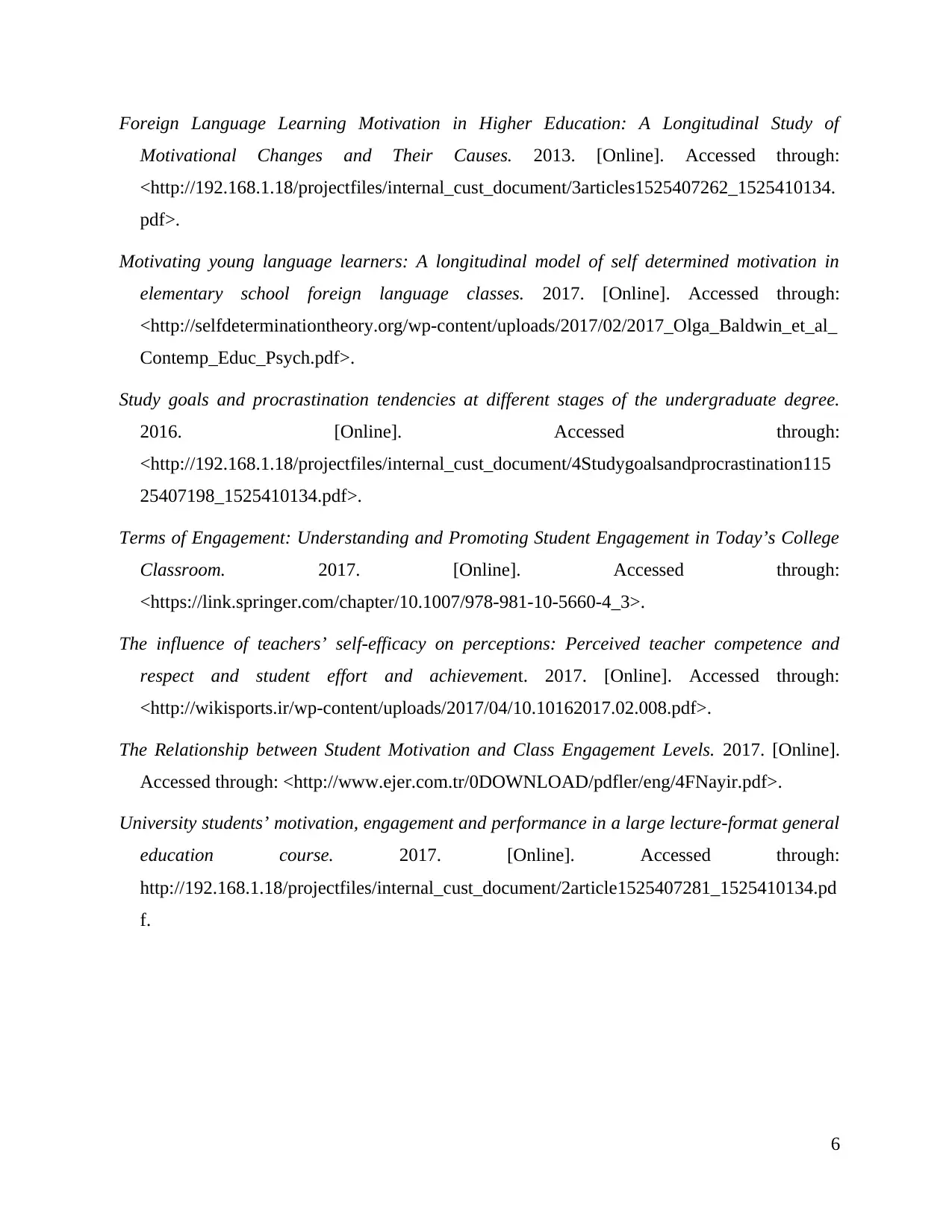
Foreign Language Learning Motivation in Higher Education: A Longitudinal Study of
Motivational Changes and Their Causes. 2013. [Online]. Accessed through:
<http://192.168.1.18/projectfiles/internal_cust_document/3articles1525407262_1525410134.
pdf>.
Motivating young language learners: A longitudinal model of self determined motivation in
elementary school foreign language classes. 2017. [Online]. Accessed through:
<http://selfdeterminationtheory.org/wp-content/uploads/2017/02/2017_Olga_Baldwin_et_al_
Contemp_Educ_Psych.pdf>.
Study goals and procrastination tendencies at different stages of the undergraduate degree.
2016. [Online]. Accessed through:
<http://192.168.1.18/projectfiles/internal_cust_document/4Studygoalsandprocrastination115
25407198_1525410134.pdf>.
Terms of Engagement: Understanding and Promoting Student Engagement in Today’s College
Classroom. 2017. [Online]. Accessed through:
<https://link.springer.com/chapter/10.1007/978-981-10-5660-4_3>.
The influence of teachers’ self-efficacy on perceptions: Perceived teacher competence and
respect and student effort and achievement. 2017. [Online]. Accessed through:
<http://wikisports.ir/wp-content/uploads/2017/04/10.10162017.02.008.pdf>.
The Relationship between Student Motivation and Class Engagement Levels. 2017. [Online].
Accessed through: <http://www.ejer.com.tr/0DOWNLOAD/pdfler/eng/4FNayir.pdf>.
University students’ motivation, engagement and performance in a large lecture-format general
education course. 2017. [Online]. Accessed through:
http://192.168.1.18/projectfiles/internal_cust_document/2article1525407281_1525410134.pd
f.
6
Motivational Changes and Their Causes. 2013. [Online]. Accessed through:
<http://192.168.1.18/projectfiles/internal_cust_document/3articles1525407262_1525410134.
pdf>.
Motivating young language learners: A longitudinal model of self determined motivation in
elementary school foreign language classes. 2017. [Online]. Accessed through:
<http://selfdeterminationtheory.org/wp-content/uploads/2017/02/2017_Olga_Baldwin_et_al_
Contemp_Educ_Psych.pdf>.
Study goals and procrastination tendencies at different stages of the undergraduate degree.
2016. [Online]. Accessed through:
<http://192.168.1.18/projectfiles/internal_cust_document/4Studygoalsandprocrastination115
25407198_1525410134.pdf>.
Terms of Engagement: Understanding and Promoting Student Engagement in Today’s College
Classroom. 2017. [Online]. Accessed through:
<https://link.springer.com/chapter/10.1007/978-981-10-5660-4_3>.
The influence of teachers’ self-efficacy on perceptions: Perceived teacher competence and
respect and student effort and achievement. 2017. [Online]. Accessed through:
<http://wikisports.ir/wp-content/uploads/2017/04/10.10162017.02.008.pdf>.
The Relationship between Student Motivation and Class Engagement Levels. 2017. [Online].
Accessed through: <http://www.ejer.com.tr/0DOWNLOAD/pdfler/eng/4FNayir.pdf>.
University students’ motivation, engagement and performance in a large lecture-format general
education course. 2017. [Online]. Accessed through:
http://192.168.1.18/projectfiles/internal_cust_document/2article1525407281_1525410134.pd
f.
6
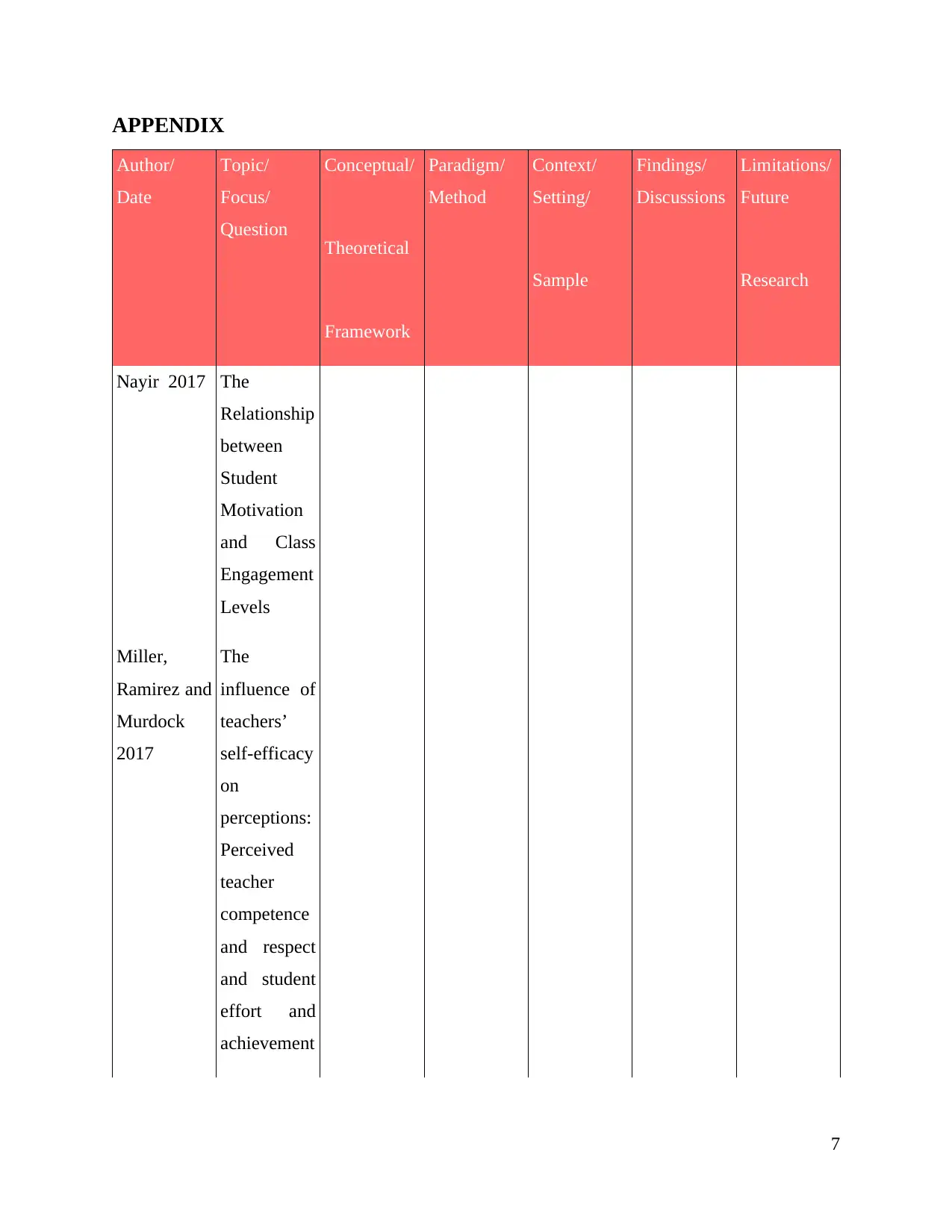
APPENDIX
Author/
Date
Topic/
Focus/
Question
Conceptual/
Theoretical
Framework
Paradigm/
Method
Context/
Setting/
Sample
Findings/
Discussions
Limitations/
Future
Research
Nayir 2017 The
Relationship
between
Student
Motivation
and Class
Engagement
Levels
Miller,
Ramirez and
Murdock
2017
The
influence of
teachers’
self-efficacy
on
perceptions:
Perceived
teacher
competence
and respect
and student
effort and
achievement
7
Author/
Date
Topic/
Focus/
Question
Conceptual/
Theoretical
Framework
Paradigm/
Method
Context/
Setting/
Sample
Findings/
Discussions
Limitations/
Future
Research
Nayir 2017 The
Relationship
between
Student
Motivation
and Class
Engagement
Levels
Miller,
Ramirez and
Murdock
2017
The
influence of
teachers’
self-efficacy
on
perceptions:
Perceived
teacher
competence
and respect
and student
effort and
achievement
7
⊘ This is a preview!⊘
Do you want full access?
Subscribe today to unlock all pages.

Trusted by 1+ million students worldwide
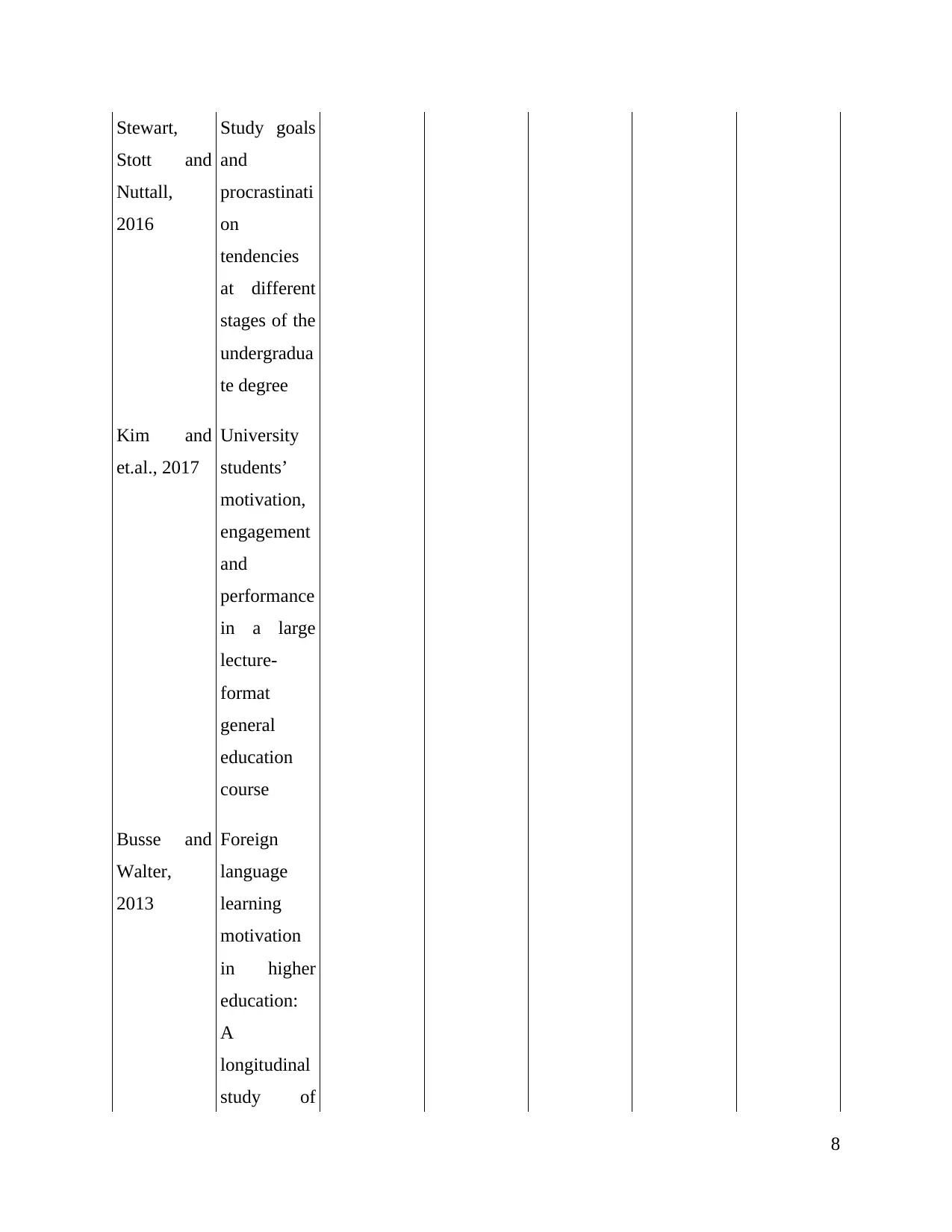
Stewart,
Stott and
Nuttall,
2016
Study goals
and
procrastinati
on
tendencies
at different
stages of the
undergradua
te degree
Kim and
et.al., 2017
University
students’
motivation,
engagement
and
performance
in a large
lecture-
format
general
education
course
Busse and
Walter,
2013
Foreign
language
learning
motivation
in higher
education:
A
longitudinal
study of
8
Stott and
Nuttall,
2016
Study goals
and
procrastinati
on
tendencies
at different
stages of the
undergradua
te degree
Kim and
et.al., 2017
University
students’
motivation,
engagement
and
performance
in a large
lecture-
format
general
education
course
Busse and
Walter,
2013
Foreign
language
learning
motivation
in higher
education:
A
longitudinal
study of
8
Paraphrase This Document
Need a fresh take? Get an instant paraphrase of this document with our AI Paraphraser
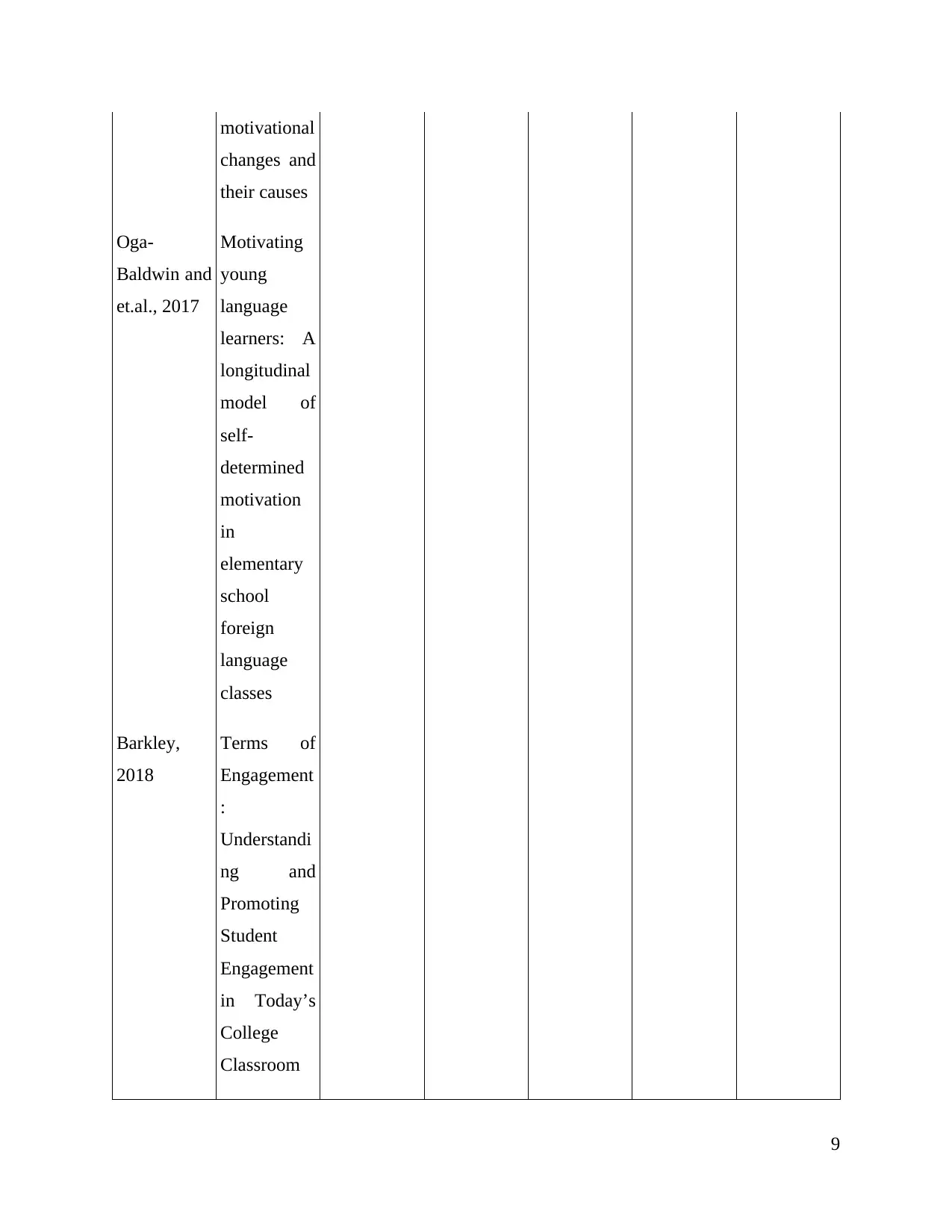
motivational
changes and
their causes
Oga-
Baldwin and
et.al., 2017
Motivating
young
language
learners: A
longitudinal
model of
self-
determined
motivation
in
elementary
school
foreign
language
classes
Barkley,
2018
Terms of
Engagement
:
Understandi
ng and
Promoting
Student
Engagement
in Today’s
College
Classroom
9
changes and
their causes
Oga-
Baldwin and
et.al., 2017
Motivating
young
language
learners: A
longitudinal
model of
self-
determined
motivation
in
elementary
school
foreign
language
classes
Barkley,
2018
Terms of
Engagement
:
Understandi
ng and
Promoting
Student
Engagement
in Today’s
College
Classroom
9
1 out of 11
Related Documents
Your All-in-One AI-Powered Toolkit for Academic Success.
+13062052269
info@desklib.com
Available 24*7 on WhatsApp / Email
![[object Object]](/_next/static/media/star-bottom.7253800d.svg)
Unlock your academic potential
Copyright © 2020–2026 A2Z Services. All Rights Reserved. Developed and managed by ZUCOL.





